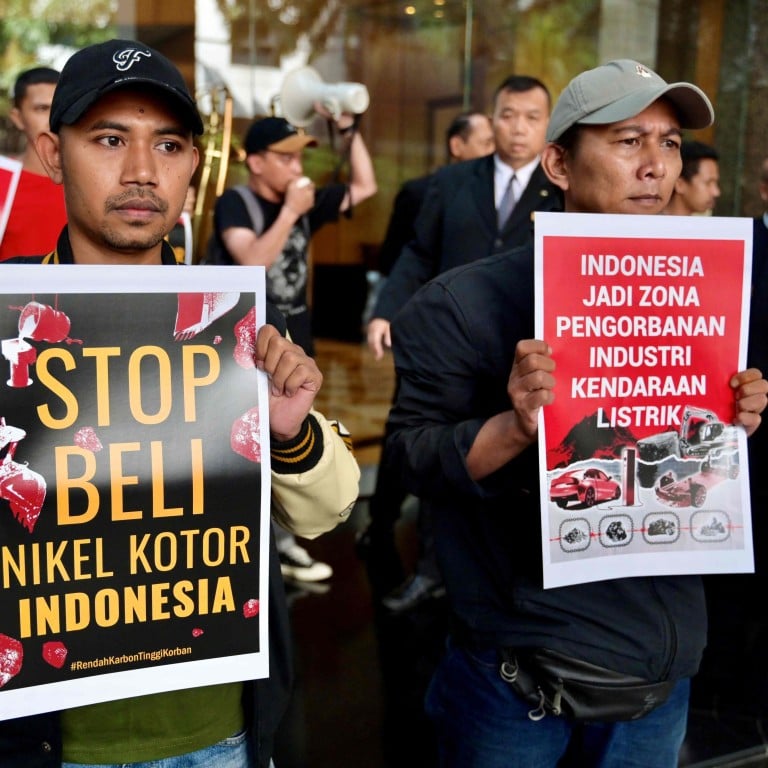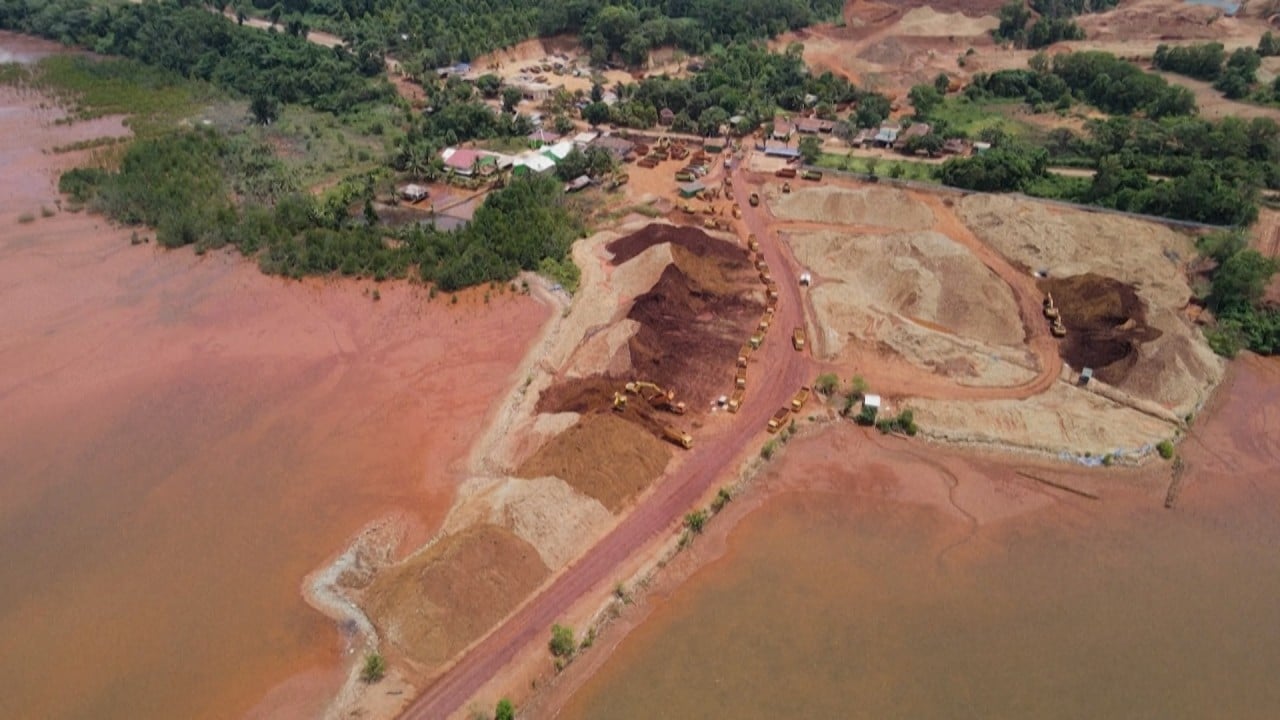
Indonesia gets ‘wake-up call’ to step up sustainability efforts in nickel industry after BASF pull-out
- The ‘wake-up call’ comes after foreign investors cancelled a US$2.6 billion nickel-cobalt refining project over falling prices and environmental concerns
In a rare admission, Indonesia’s government acknowledged on Friday the need to address sustainability in its nickel industry after German chemical giant BASF and French miner Eramet cancelled a US$2.6 billion nickel-cobalt refining complex project in the mineral-rich country.
The termination comes amid falling prices of nickel and a campaign by non-government organisations who say the project in North Maluku province risked destroying rainforest inhabited by indigenous people.
“BASF’s decision to withdraw its US$2.6 billion investment in the Sonic Bay project in Halmahera is quite unfortunate,” Nizhar Marizi, director of energy, mineral resources and mining at the Ministry of National Development Planning (Bappenas), told This Week In Asia.
“However, the cancellation serves as a wake-up call to address underlying issues in the investment climate, especially in the sustainability aspect of nickel commodities,” Nizhar said.
“It also prompts us to review the overall governance of our downstream industries, namely enhancing the regulatory framework, improving the ease of doing business and offering more attractive incentives to international companies.”
By addressing those challenges, Indonesia could attract a broader range of global investors, he said.

The project, known as Sonic Bay, had aimed to refine nickel and cobalt from the Weda Bay nickel mine on the island of Halmahera in Indonesia’s eastern province of North Maluku. Eramet has a minority stake in the Weda Bay mine.
The cancelled venture has also dealt a blow to the country’s efforts to broaden investments beyond China in the nickel industry where Chinese companies have built more than 90 per cent of Indonesia’s nickel smelters.
“This is a major blow to Indonesia’s ambition to build its nickel industry and diversify it beyond investment from China … [Indonesia] will continue to rely on Chinese investment and the Chinese market to build its nickel industry,” said Siwage Dharma Negara, a senior fellow at the Singapore-based ISEAS-Yusof Ishak Institute.
BASF said it would not “execute” the nickel-cobalt refining project “after a thorough evaluation” and that since the project’s inception, the “global nickel market has changed significantly”. The company made no mention of the indigenous people in its June 24 statement.
Britain-based indigenous rights group Survival International had said the Weda Bay operations were destroying the rainforest where the uncontacted Hongana Manyawa indigenous people, who avoid all interactions with outsiders, lived.
Survival International said its supporters had sent BASF and Eramet more than 20,000 emails protesting the plan and had repeatedly lobbied BASF and German authorities.
In June, a video showing a Hongana Manyawa family coming to a mining camp to ask for food after their rainforest was allegedly destroyed, went viral in Indonesia.
Muhammad Habib Abiyan Dzakwan, researcher at the Jakarta-based Centre for Strategic and International Studies, said the project cancellation highlighted the need for Indonesia to ensure higher environmental, social and governance (ESG) standards if it hoped to attract investment from industrialised countries.
“ESG standards have now become a prevailing prerequisite for companies from industrialised countries when they procure critical raw materials, including critical minerals,” he said.
Insufficient ESG-standardised practices will lower Indonesia’s competitiveness in the eyes of foreign investors, particularly those from industrialised nations, Habib said, adding that investors would turn to alternative suppliers like Australia and Canada.
“If you want to enter their (industrialised countries’) markets or participate in their supply chain, then higher ESG standards must be applied,” he said.
“[Otherwise] they will move away from investing in Indonesia, as signalled by the recent BASF’s cancellation of investment in the country’s nickel sector.”
“The Tesla case and the letter from those [US] senators should have been a critical lesson for us in the very first place,” said Habib.
Indonesia’s government has been trying for years, without luck, to attract Tesla to invest in its EV industry.
Last October, three US senators warned President Joe Biden’s administration about negotiating a critical minerals trade deal with Indonesia, expressing concerns over its standards for labour rights, environmental protection, safety and human rights.
Negara of ISEAS-Yusof Ishak Institute warned that falling nickel prices could disincentivise miners from adopting good ESG practices.
“Lower prices reduce the revenue and profitability of mining companies. Therefore, companies may prioritise immediate financial survival and profitability over long-term investments in ESG,” he said.
Indonesia has the world’s largest nickel reserves with an estimated 21 million tonnes, accounting for about 22 per cent of global reserves, according to the US Geological Survey.
The Southeast Asian nation hopes to leverage its vast nickel stockpile and output to become a major player in the global electric vehicle supply chain.

Indonesia’s nickel industry has also been heavily criticised for lax safety standards that resulted in explosions and fires at smelters, killing scores of workers in recent years.
In Konawe regency in southeast Sulawesi, where many nickel smelters are based, environmental activist Sulkarnain told This Week In Asia his hometown now suffers from air and water pollution as well as water wells drying up and smelters failing to implement proper waste disposal processes.
As of May, there are 367 nickel mining business licences distributed mainly across Southeast Sulawesi, Central Sulawesi, and North Maluku, according to World Resources Institute (WRI) Indonesia, an independent research organisation.
“The large number of participating industries poses significant challenges in ensuring the implementation of good mining practices,” said Egi Suarga, climate manager at WRI Indonesia.
Negara attributed the environmental damage and fatal accidents to the industry’s lack of compliance and the authorities’ lax enforcement of rules and regulations.
“The government must improve the regulatory framework and legal protection in the sector, improve infrastructure and promote ESG standards,” he said.
Nizhar from the Ministry of National Development Planning said several key efforts have been undertaken, including more stringent enforcement of environmental regulations for mining activities.
Those measures include mandatory environmental impact assessments for new projects and periodic environmental audits for existing operations.
“This includes pushing robust monitoring and reporting mechanisms to track performance and enforcing regular reporting on ESG metrics and third-party audits when necessary,” he said.


